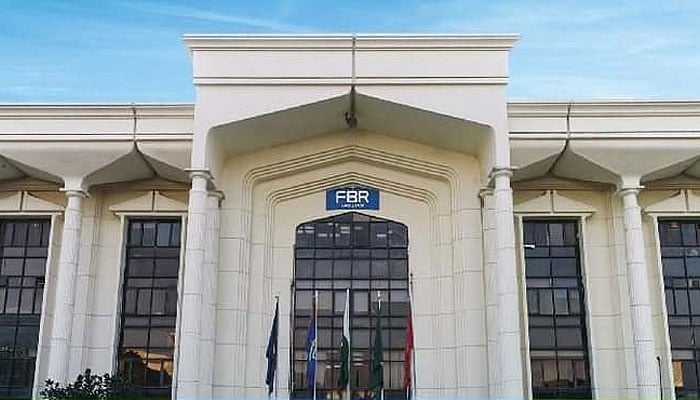Big changes being made in FBR tax machinery to achieve target
Before going into detail on point of friction, there is a need to analyse performance of tax collection on a monthly and quarterly basis
ISLAMABAD: Amid increasing risks of substantial slippages in achieving agreed monthly target with the IMF, the FBR has moved towards making drastic administrative changes that had always remained a point of friction within the fold of tax machinery.
The monthly tax collection target is heading towards slippage in the range of Rs50 to Rs80 billion in August 2024 against the assigned target of Rs898 billion for ongoing month agreed with the IMF.
Before going into detail on the point of friction, there is a need to analyse the performance of tax collection on a monthly and quarterly basis. The FBR surpassed tax collection target for the first month (July) with a slight margin of Rs4 billion, as it collected Rs660 billion against assigned target of Rs656 billion.
Pakistan and the IMF had struck a Staff Level Agreement (SLA) under $7 billion Extended Fund Facility (EFF) on July 12. But the Fund Executive Board had not yet taken Pakistan loan approval on its agenda list. In case of massive shortfall for August and September 2024, the IMF may take it very seriously.
The FBR was assigned Rs12,970 billion, as approved by the parliament, but IMF slightly reduced the target and assigned it to collect Rs12,913 billion till June 30, 2025.
It seems there is no worry at the top despite a warning extended by the IMF that if revenue collection target was missed out with a margin of 2 percent against the agreed target of Rs2,652 billion for the first quarter (July-Sept), the Fund would ask for a mini-budget to impose additional taxes. The Rs2,652 billion agreed target for the first quarter translates into slippages of Rs60 billion. The FBR has collected Rs565 billion till August 27, and the tax machinery requires the collection of Rs333 billion in the remaining four days of this ongoing month. The newly-appointed FBR Chairman, Rashid Mahmood Langrial, took some drastic steps and directed to make changes in collection of assigned targets at the import stage. Within the ranks of FBR, there is a clear division between the Inland Revenue Service (IRS) and Customs on jurisdiction and collection of four major taxes. IRS is responsible for dealing with three major taxes, including Income Tax, Withholding Taxes, General Sales Tax and Federal Excise Duty, while Customs deals with collection of Customs Duty. According to FBR, the chairman was informed the Customs Wing collected Rs3,385 billion during the last Financial Year 2023-24, which includes Rs1,104 billion Customs Duty, Rs1,864 billion Sales Tax and Rs37 billion Federal Excise Duty at import stage. The FBR’s Directorate of Research & Analysis (DRA) assigned Customs Duty target of Rs1,591 billion to Customs Wing for current Financial Year. It has been observed by chairman FBR during one of the recent presentations that for effective revenue optimisation, the collecting agency should be made responsible by assigning appropriate targets. The FBR’s Directorate of Research Analysis has requested import stage targets of these taxes/duty may be segregated and assigned to the Customs Wing in consultation with Customs Operations Wing. Drastic changes in collection of assigned targets within tax machinery might create ripples and result in eruption of discrepancies within the taxation system, as GST at import stage-related data was matched with domestic Sales Tax activities. Experts have asked how the refunds would be calculated, reconciled and disbursed in case of fragmentation between Sales Tax at the import stage and domestic Sales Tax activities.
-
 Dua Lipa Wishes Her 'always And Forever' Callum Turner Happy Birthday
Dua Lipa Wishes Her 'always And Forever' Callum Turner Happy Birthday -
 Police Dressed As Money Heist, Captain America Raid Mobile Theft At Carnival
Police Dressed As Money Heist, Captain America Raid Mobile Theft At Carnival -
 Winter Olympics 2026: Top Contenders Poised To Win Gold In Women’s Figure Skating
Winter Olympics 2026: Top Contenders Poised To Win Gold In Women’s Figure Skating -
 Inside The Moment King Charles Put Prince William In His Place For Speaking Against Andrew
Inside The Moment King Charles Put Prince William In His Place For Speaking Against Andrew -
 Will AI Take Your Job After Graduation? Here’s What Research Really Says
Will AI Take Your Job After Graduation? Here’s What Research Really Says -
 California Cop Accused Of Using Bogus 911 Calls To Reach Ex-partner
California Cop Accused Of Using Bogus 911 Calls To Reach Ex-partner -
 AI Film School Trains Hollywood's Next Generation Of Filmmakers
AI Film School Trains Hollywood's Next Generation Of Filmmakers -
 Royal Expert Claims Meghan Markle Is 'running Out Of Friends'
Royal Expert Claims Meghan Markle Is 'running Out Of Friends' -
 Bruno Mars' Valentine's Day Surprise Labelled 'classy Promo Move'
Bruno Mars' Valentine's Day Surprise Labelled 'classy Promo Move' -
 Ed Sheeran Shares His Trick Of Turning Bad Memories Into Happy Ones
Ed Sheeran Shares His Trick Of Turning Bad Memories Into Happy Ones -
 Teyana Taylor Reflects On Her Friendship With Julia Roberts
Teyana Taylor Reflects On Her Friendship With Julia Roberts -
 Bright Green Comet C/2024 E1 Nears Closest Approach Before Leaving Solar System
Bright Green Comet C/2024 E1 Nears Closest Approach Before Leaving Solar System -
 Meghan Markle Warns Prince Harry As Royal Family Lands In 'biggest Crises' Since Death Of Princess Diana
Meghan Markle Warns Prince Harry As Royal Family Lands In 'biggest Crises' Since Death Of Princess Diana -
 Elon Musk Weighs Parenthood Against AI Boom, Sparking Public Debate
Elon Musk Weighs Parenthood Against AI Boom, Sparking Public Debate -
 'Elderly' Nanny Arrested By ICE Outside Employer's Home, Freed After Judge's Order
'Elderly' Nanny Arrested By ICE Outside Employer's Home, Freed After Judge's Order -
 Keke Palmer On Managing Growing Career With 2-year-old Son: 'It's A Lot'
Keke Palmer On Managing Growing Career With 2-year-old Son: 'It's A Lot'




